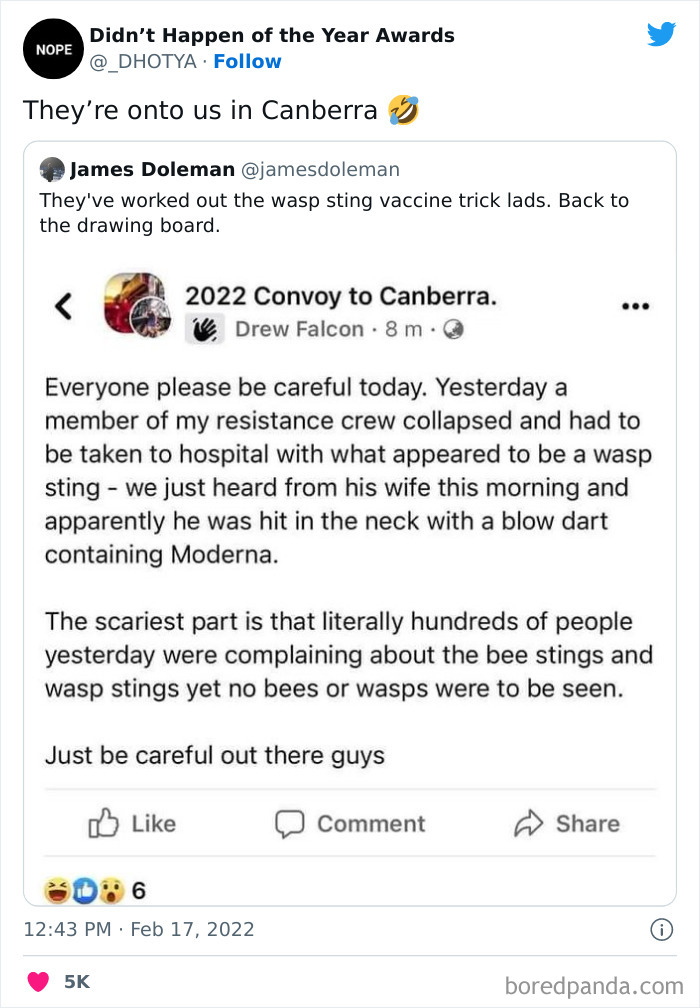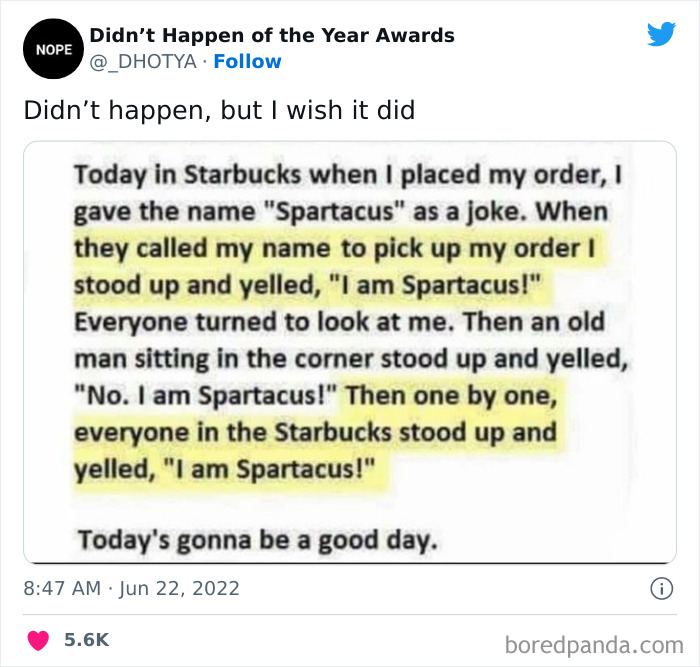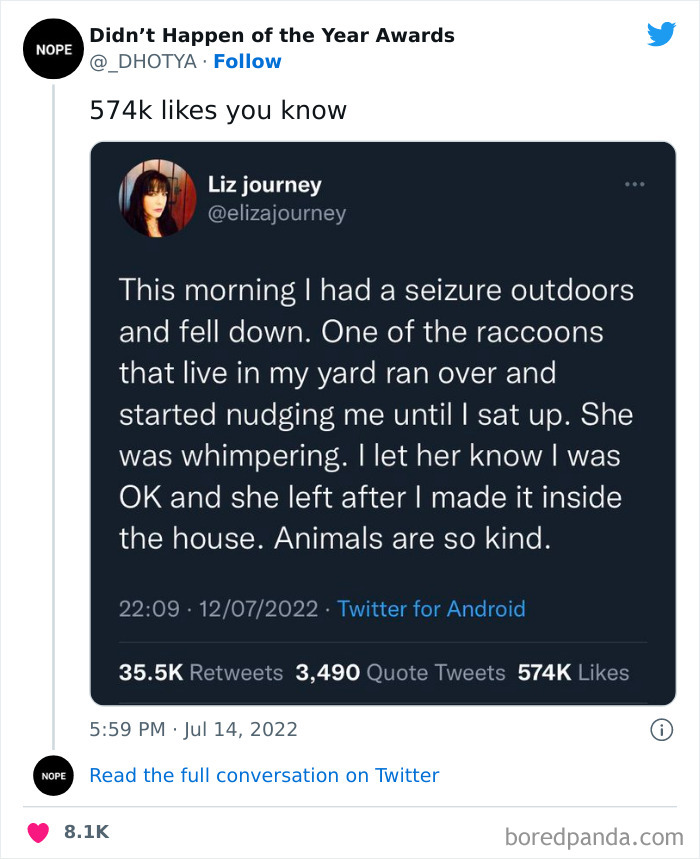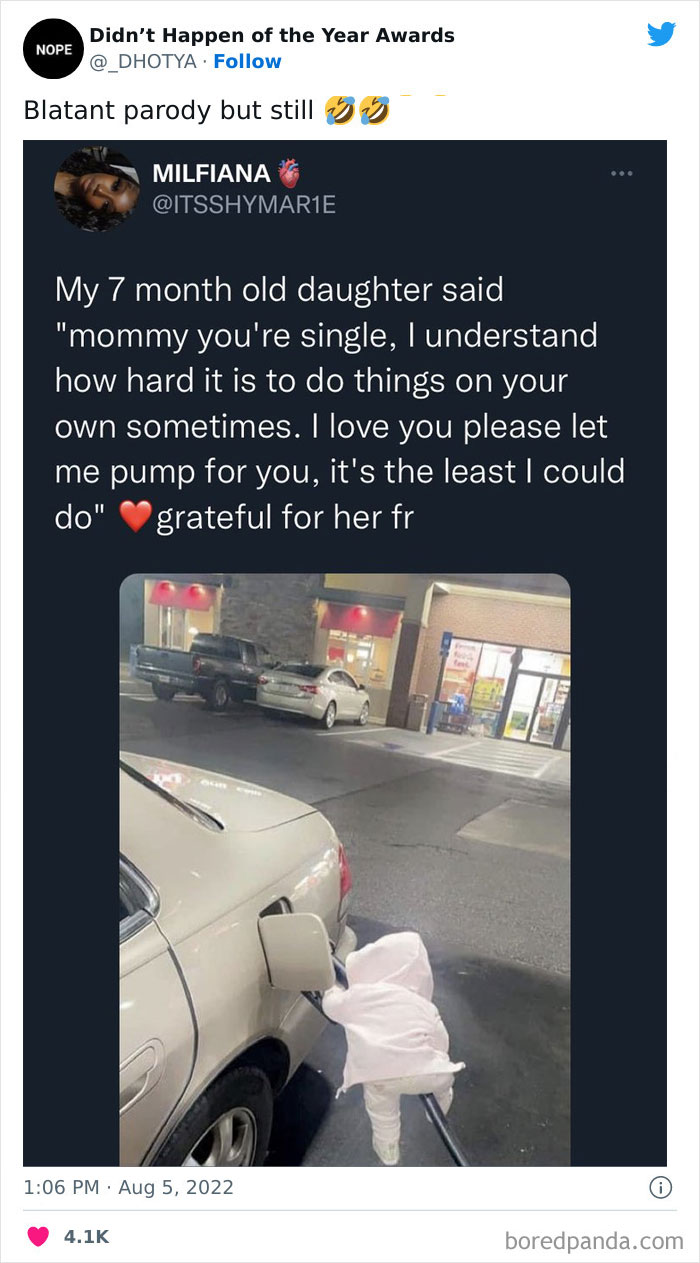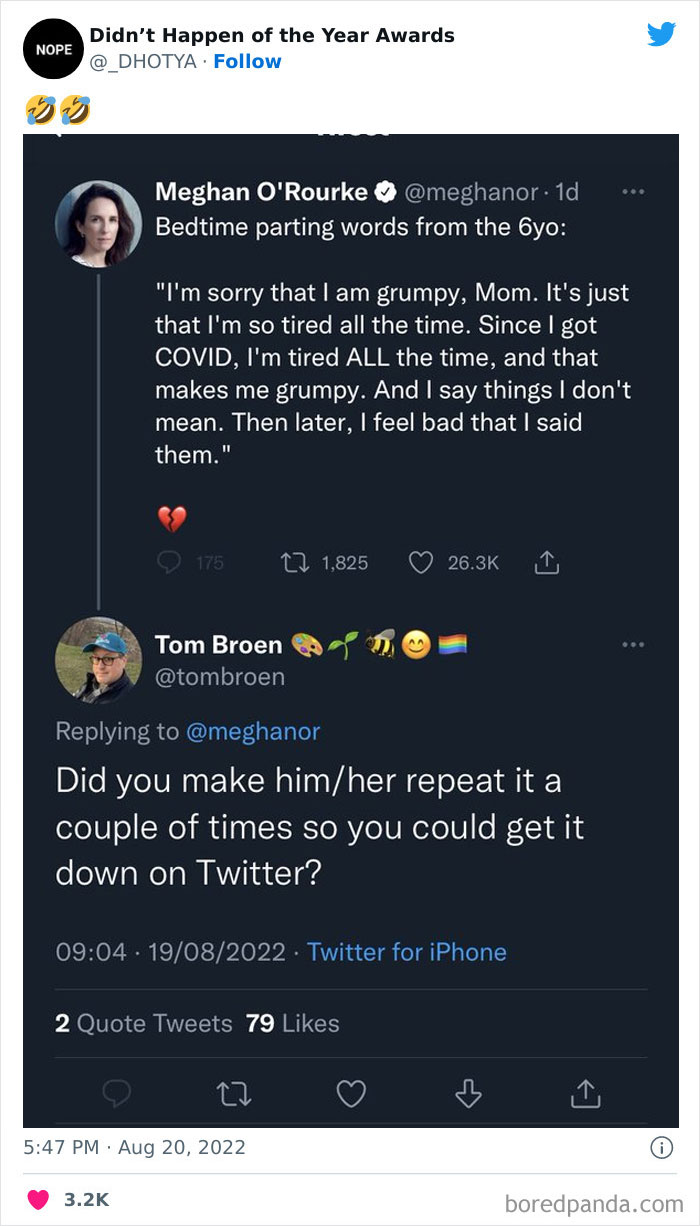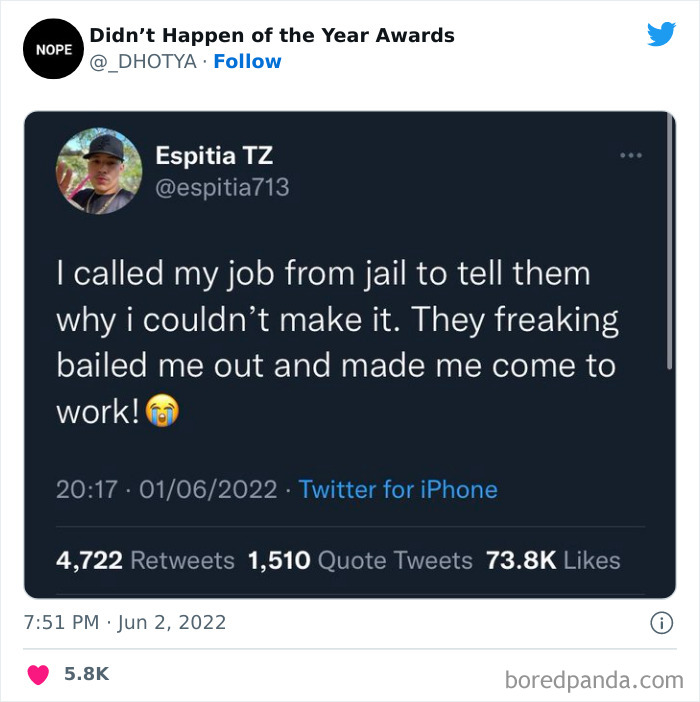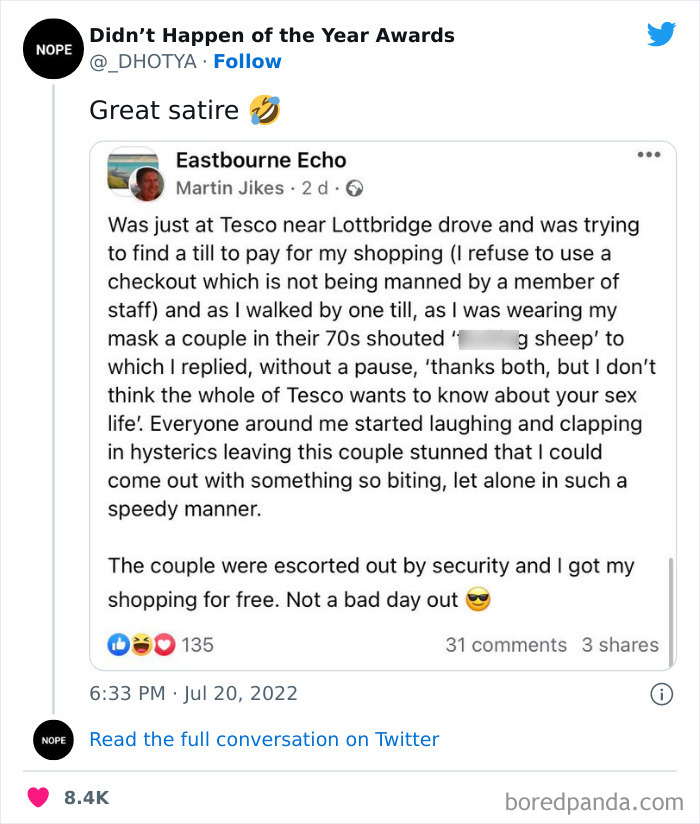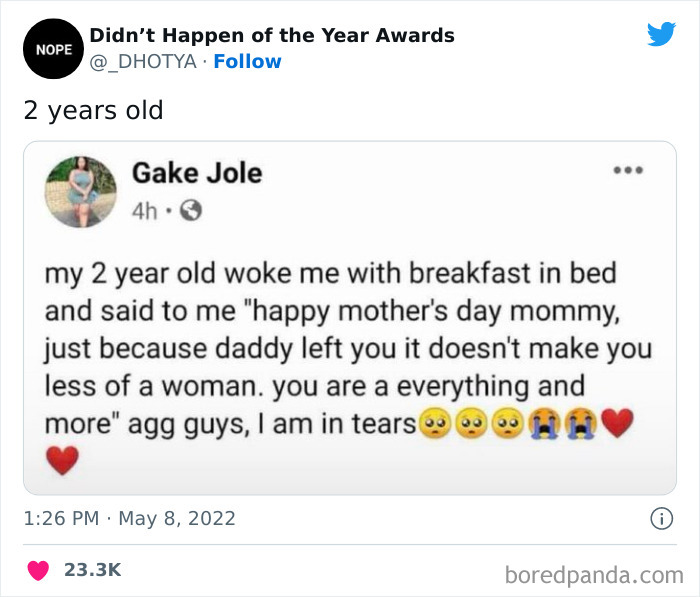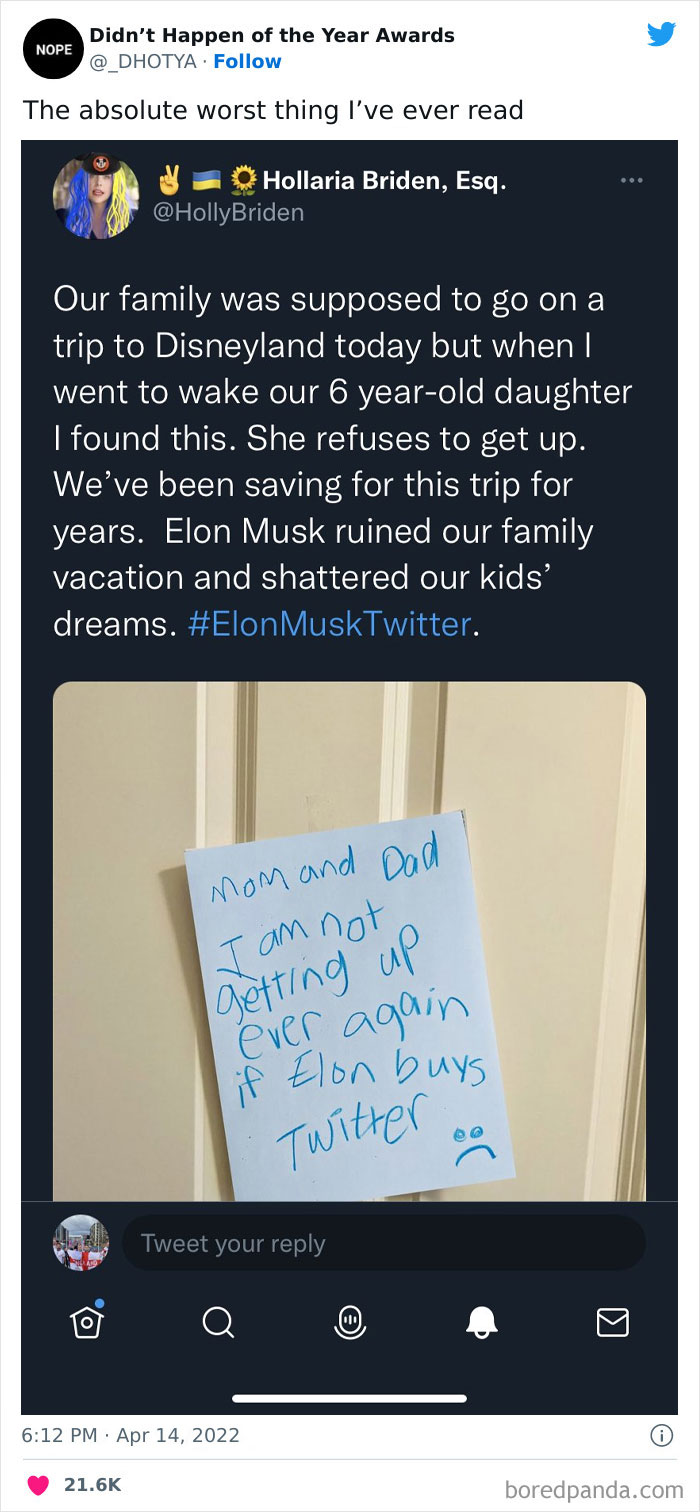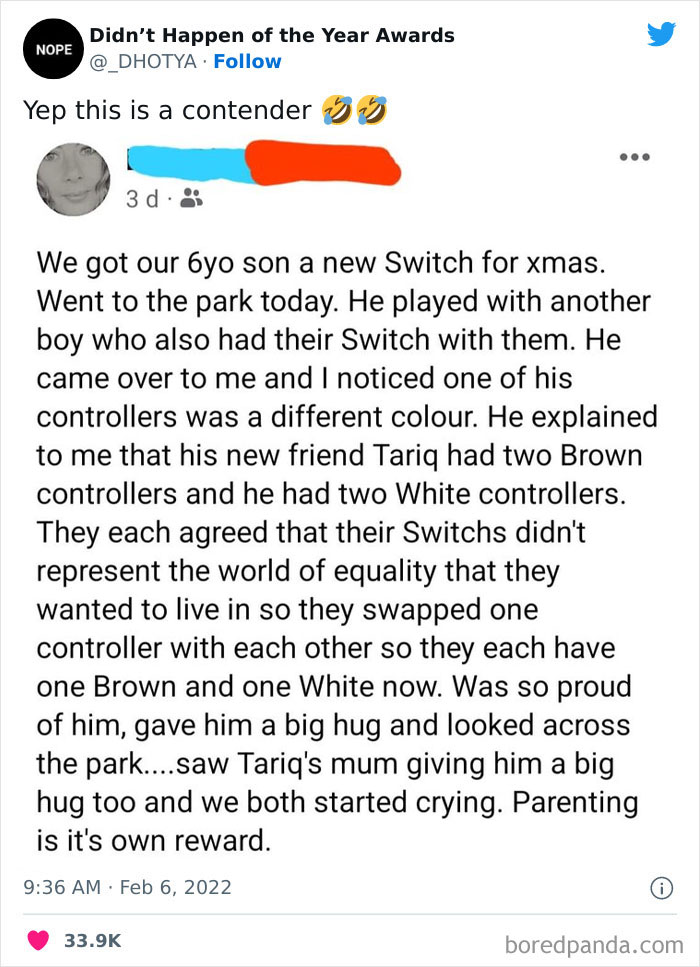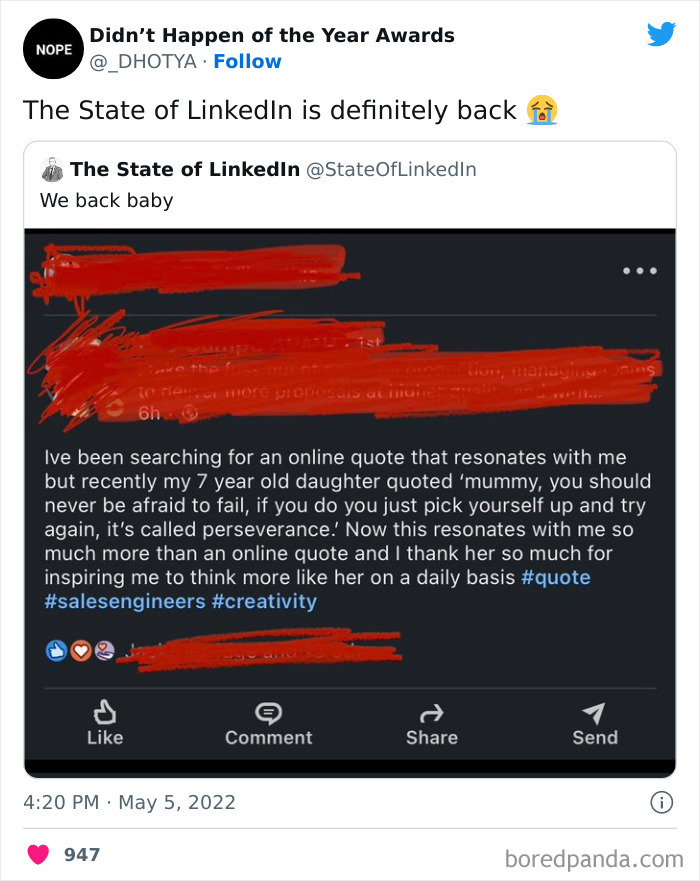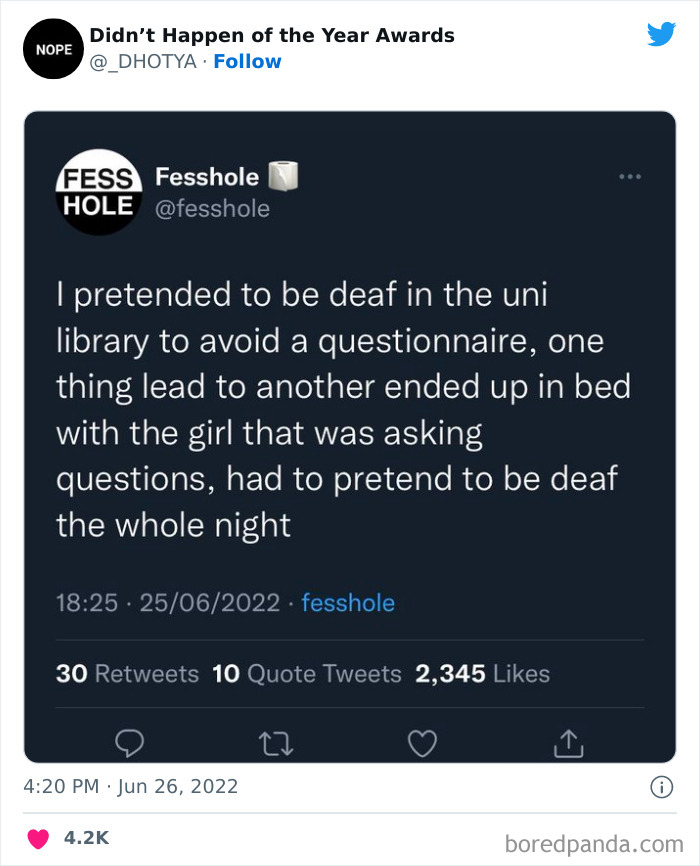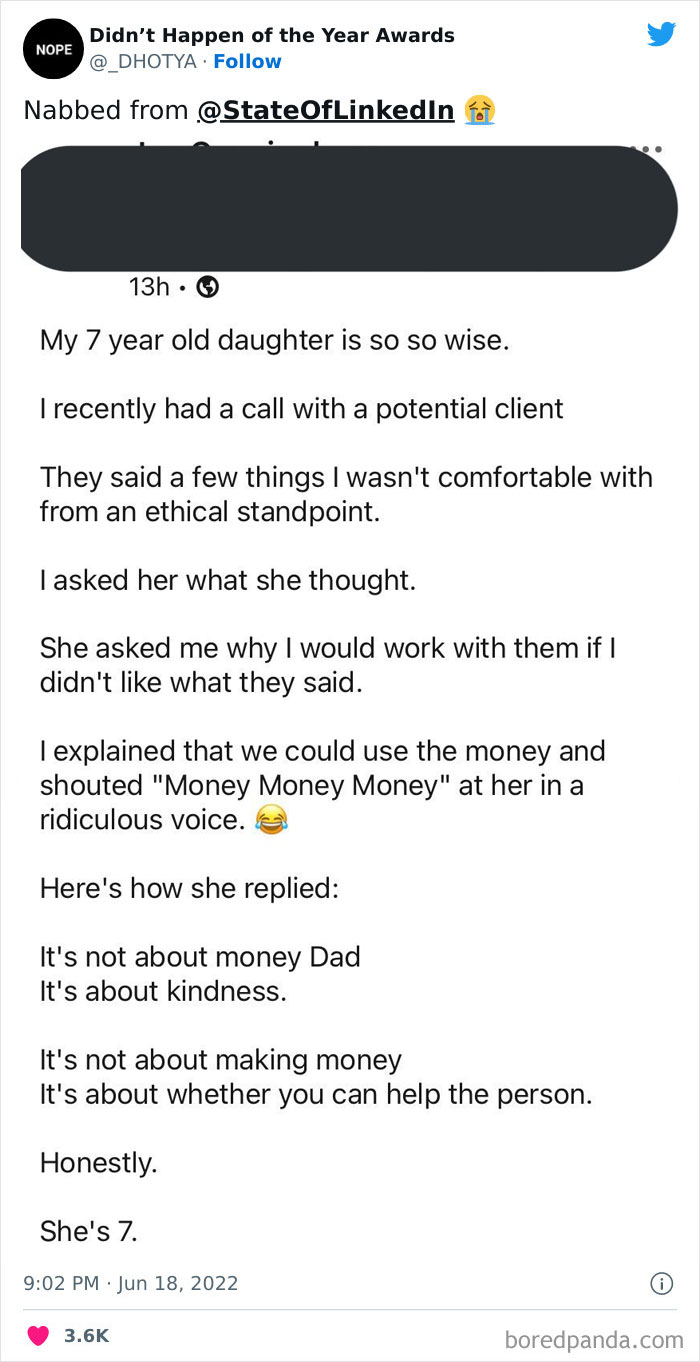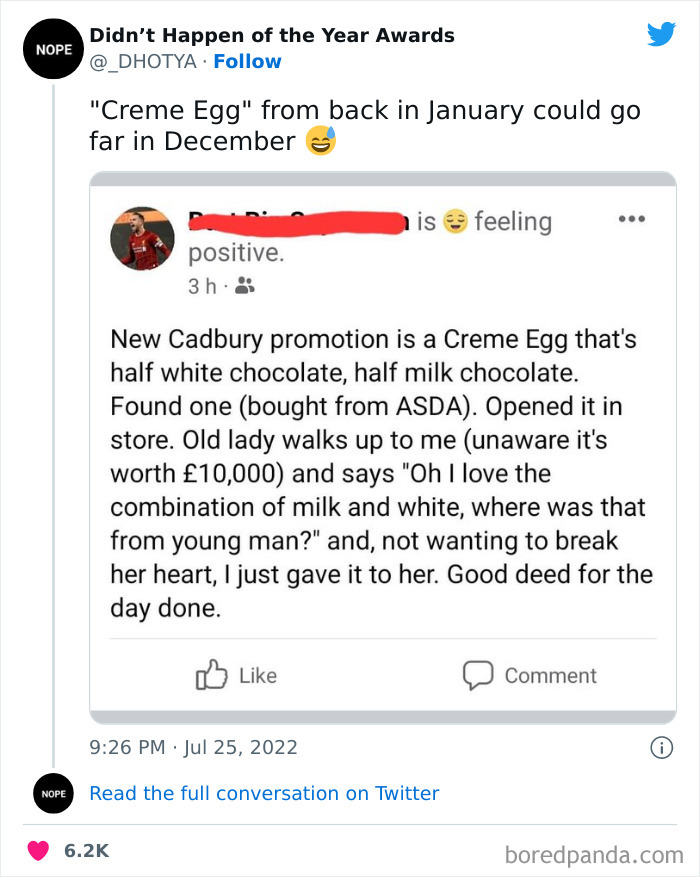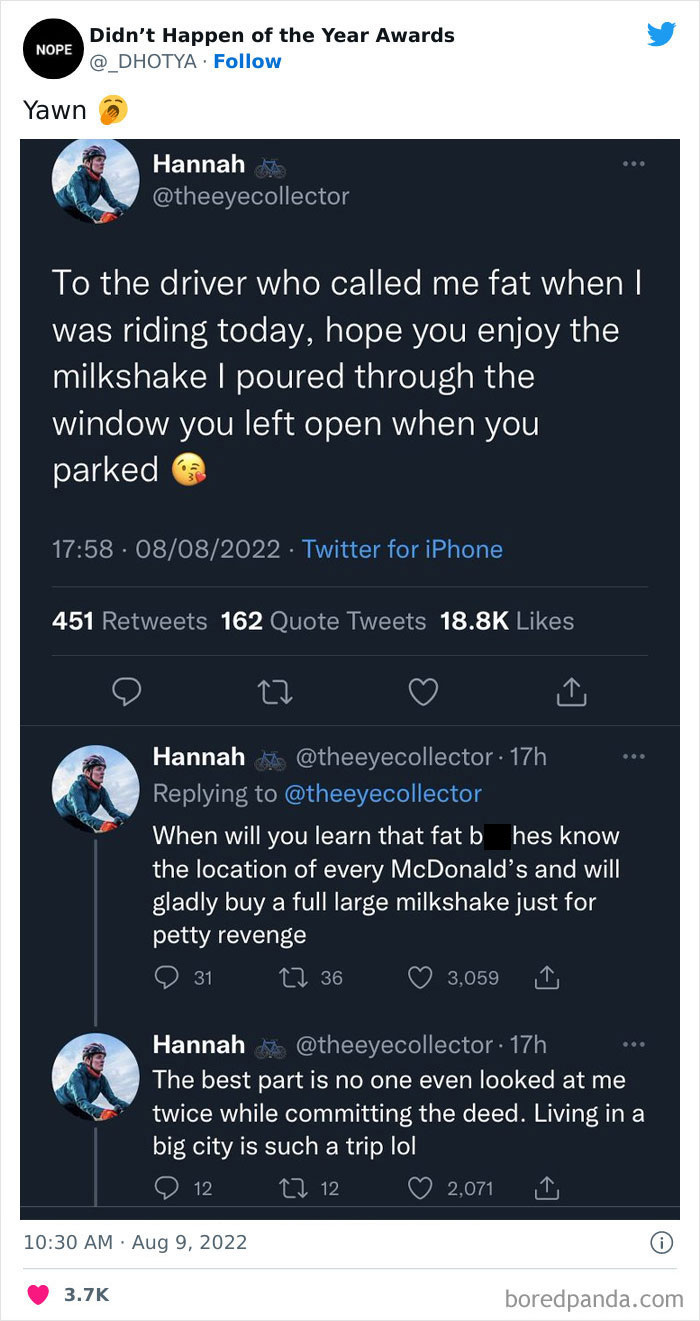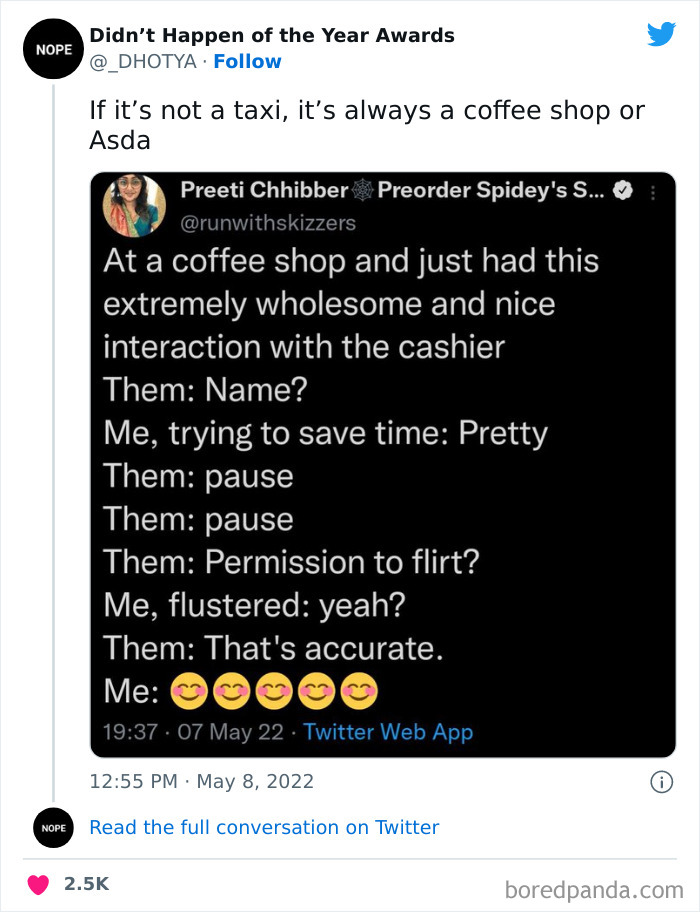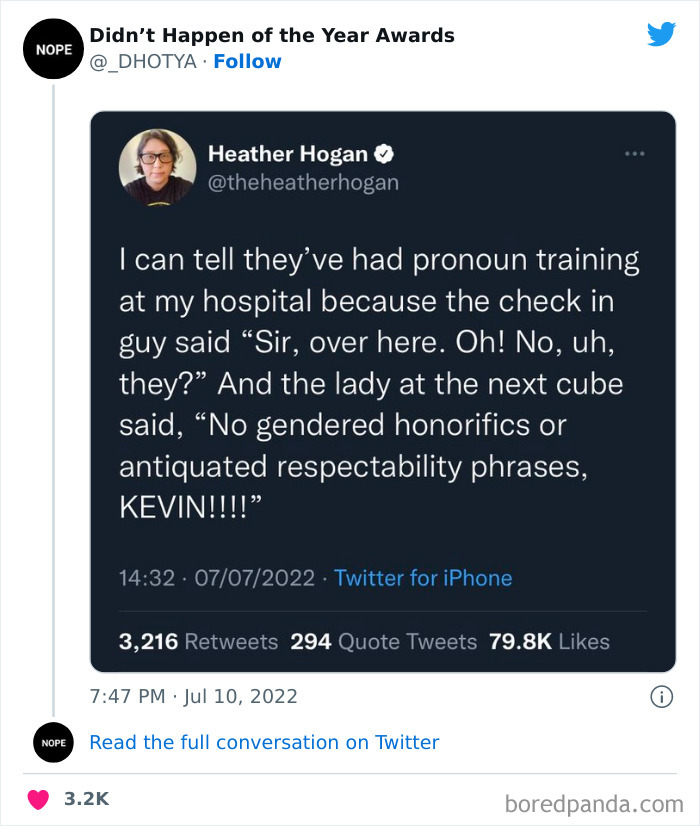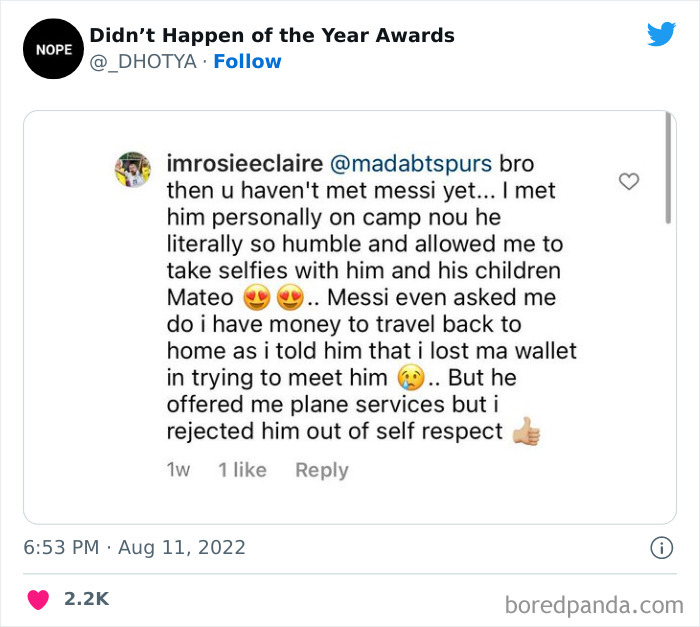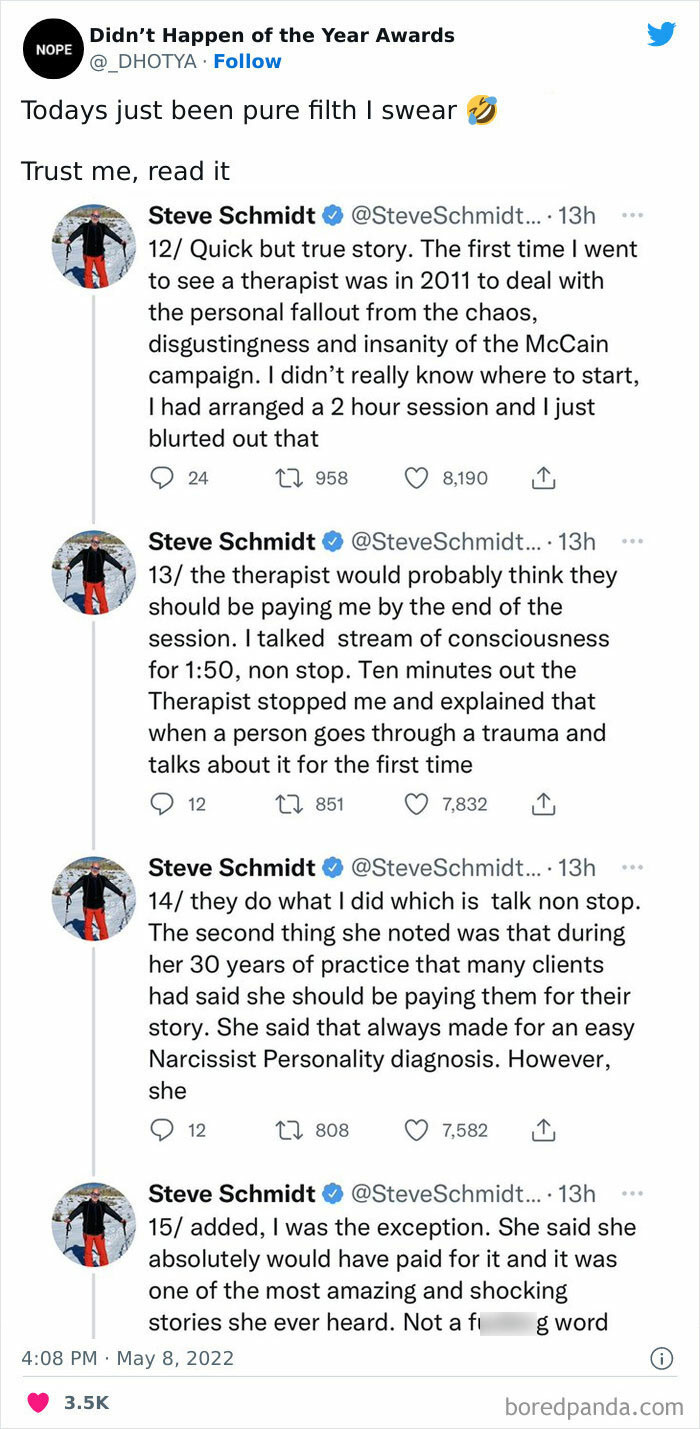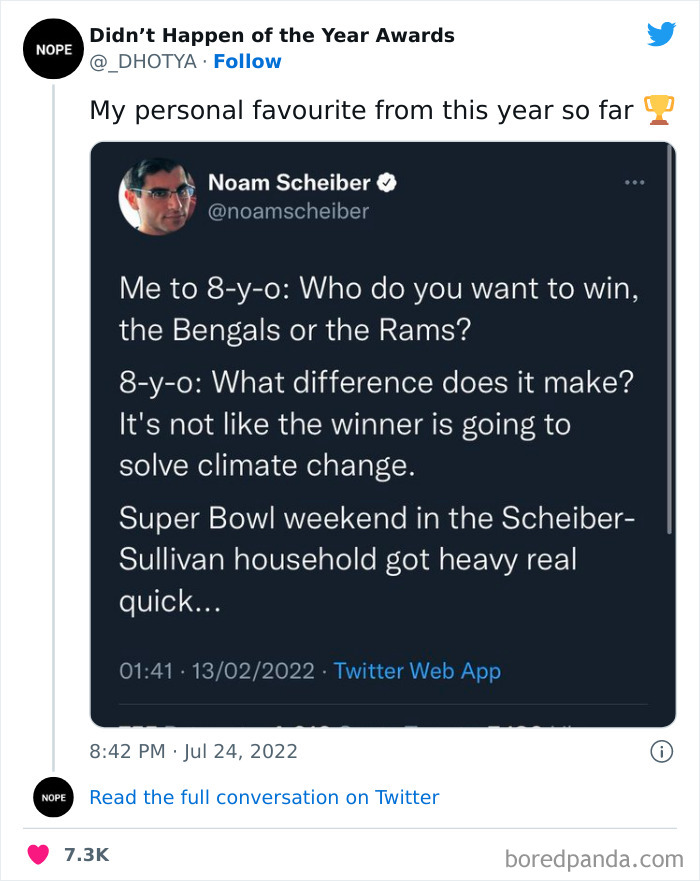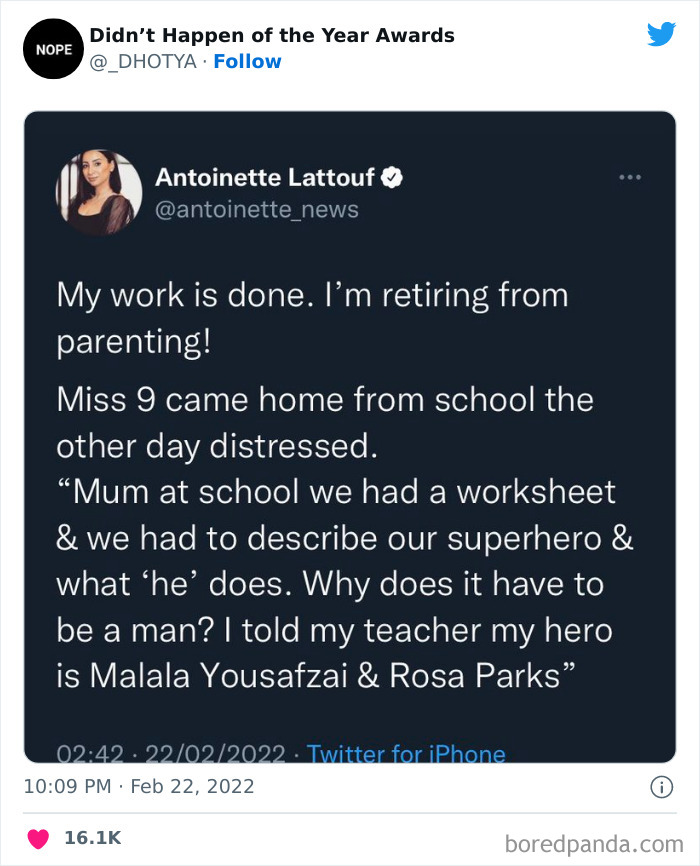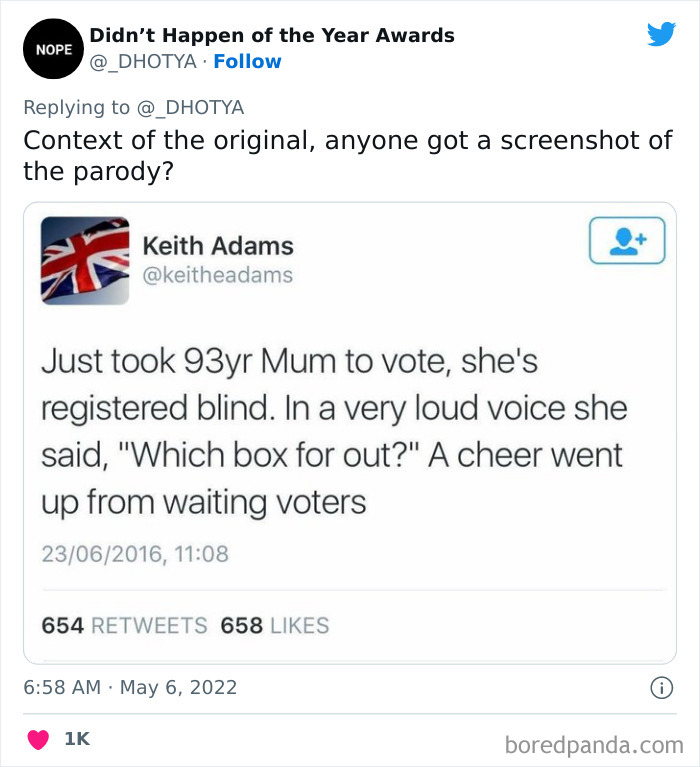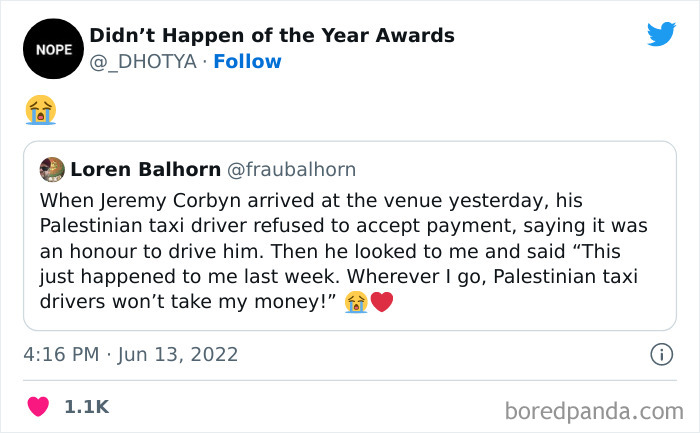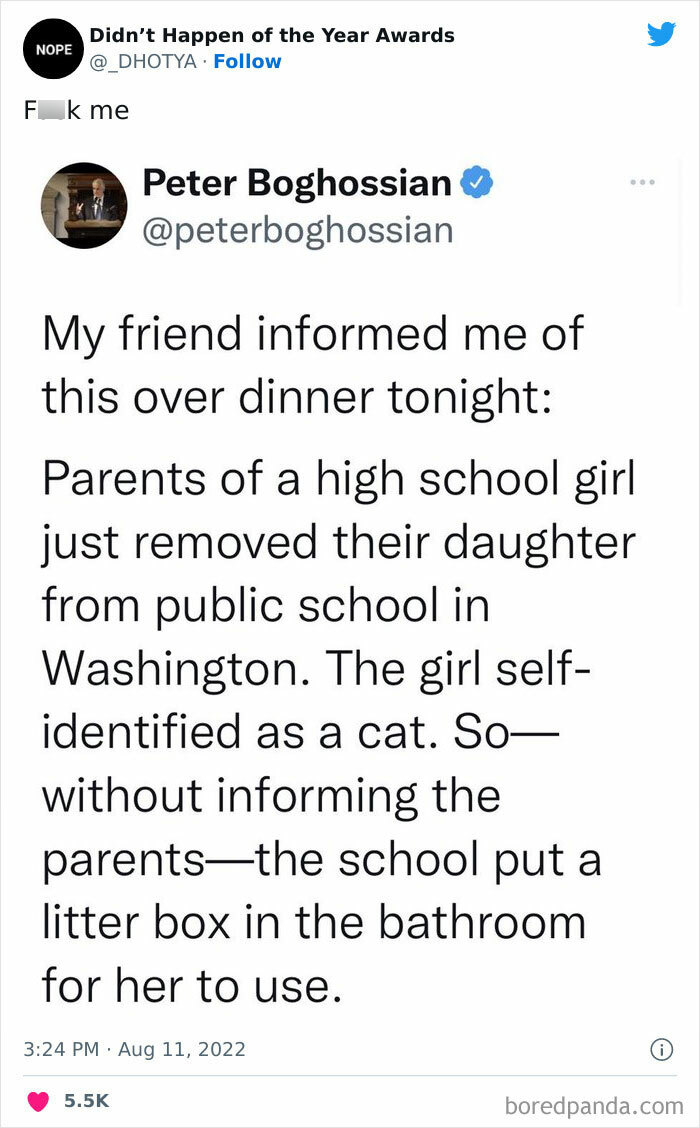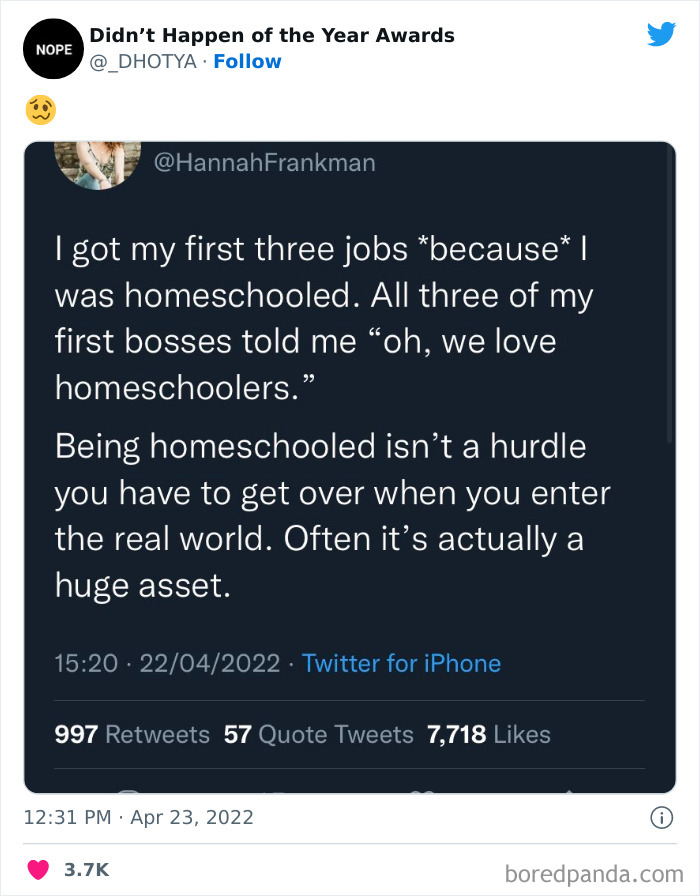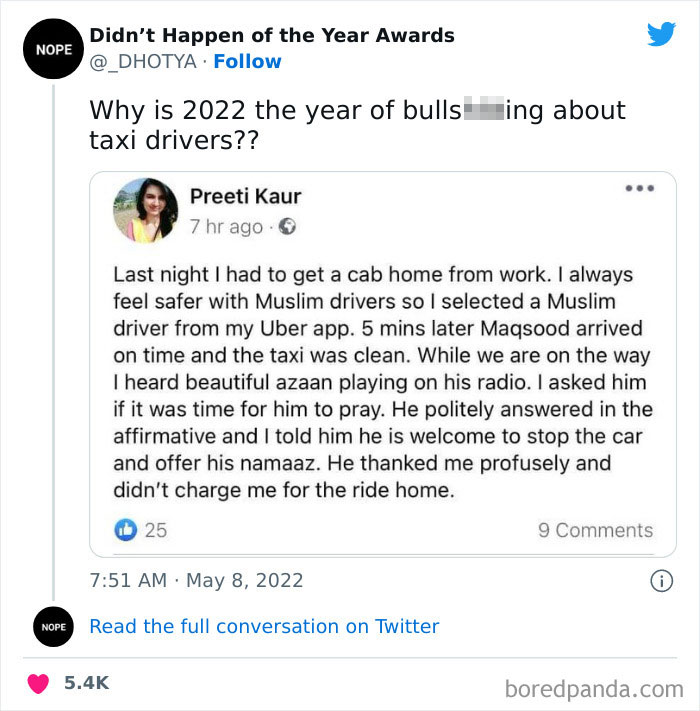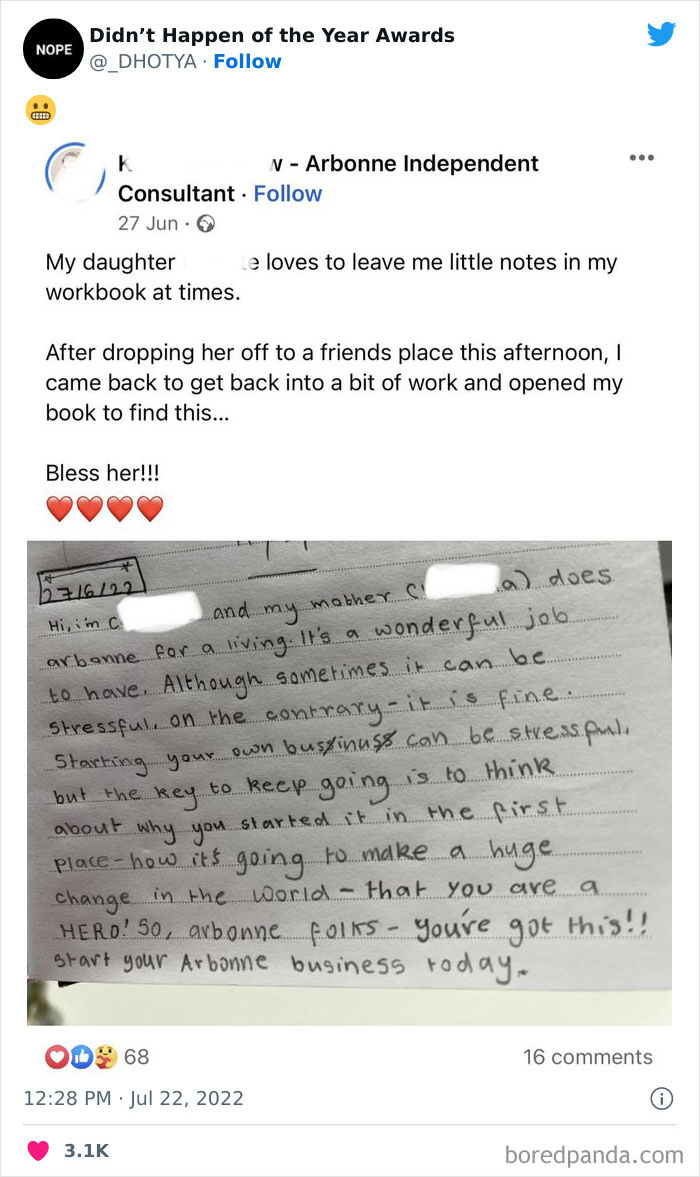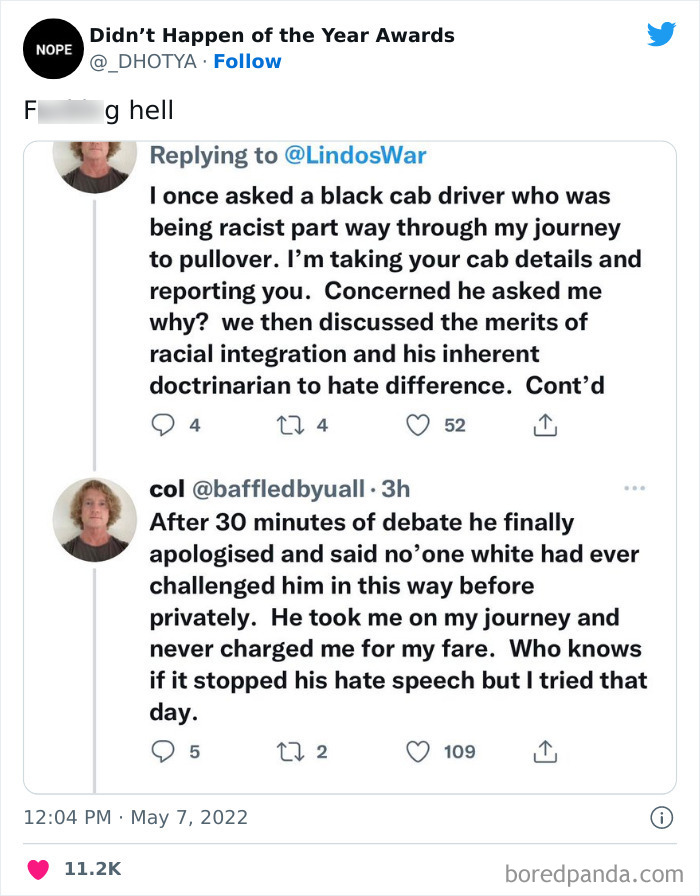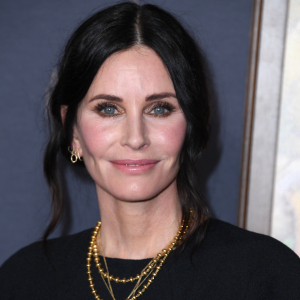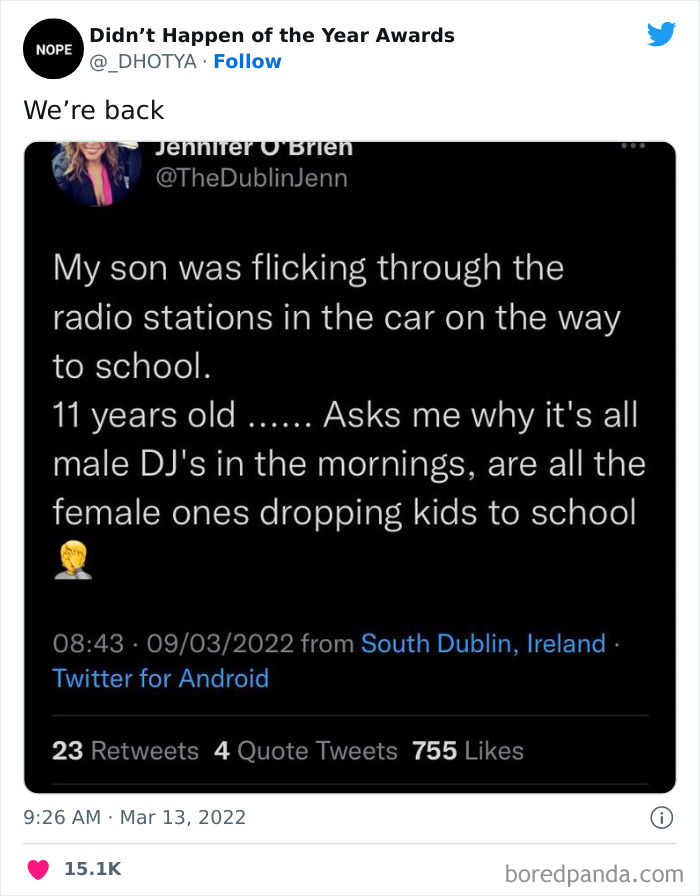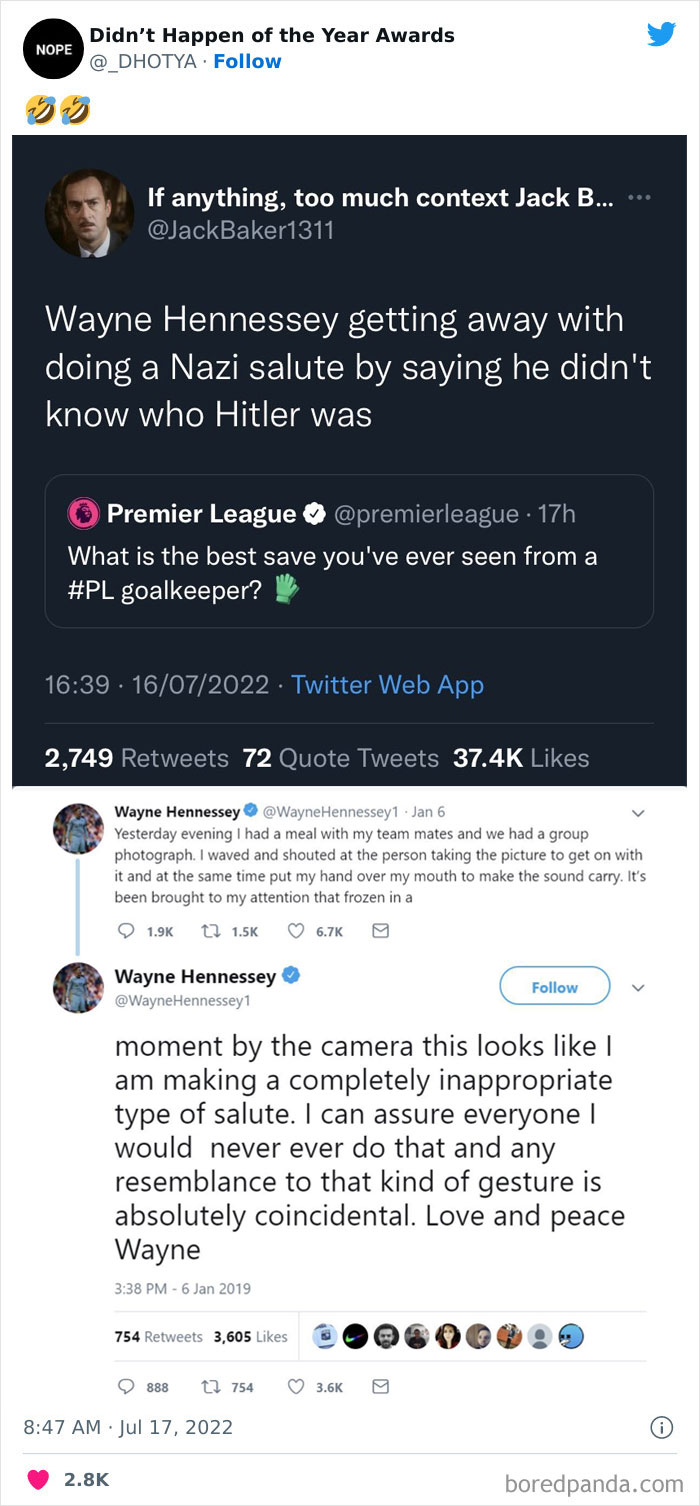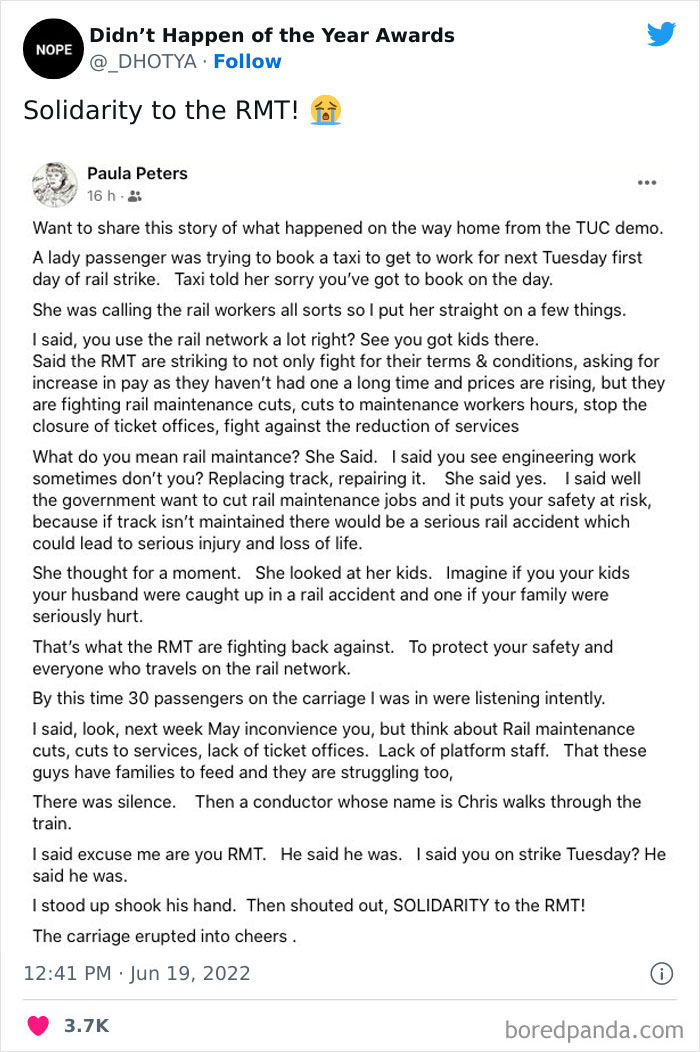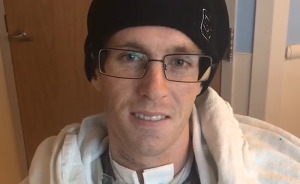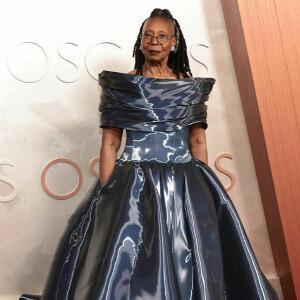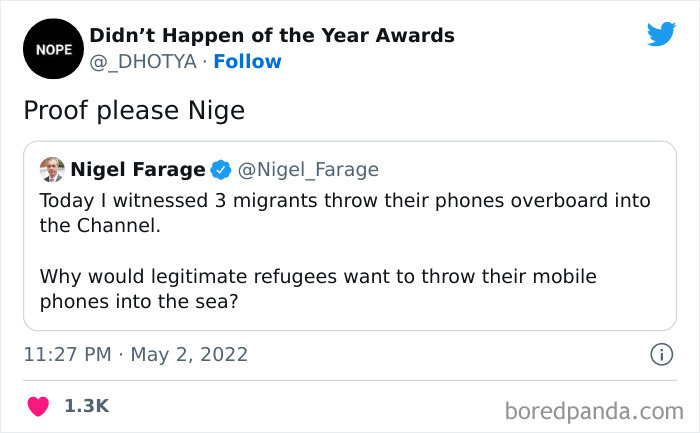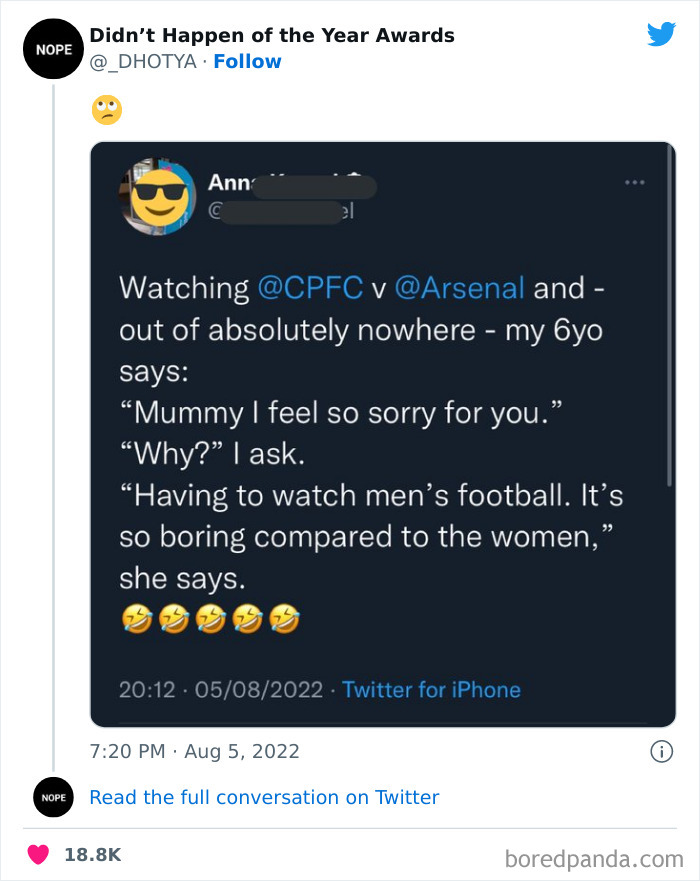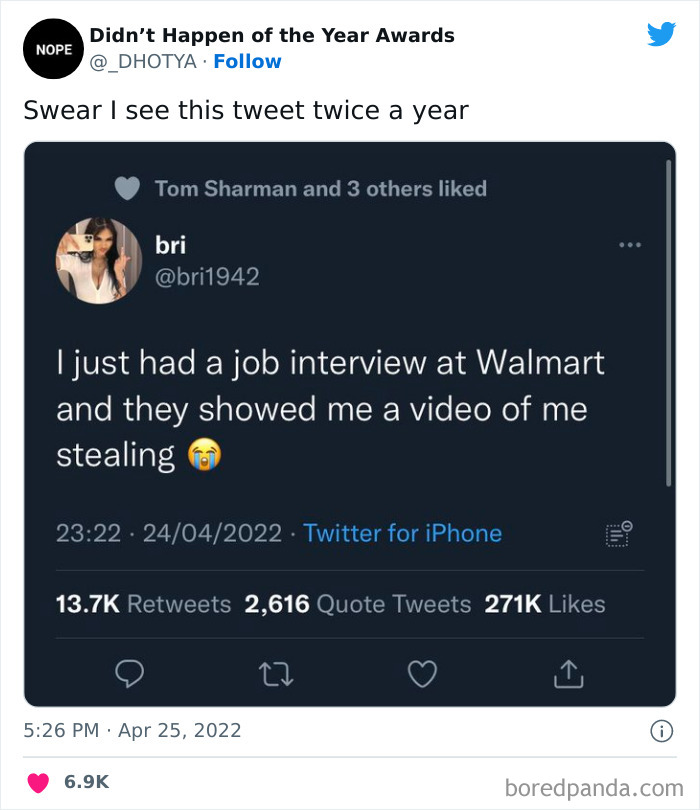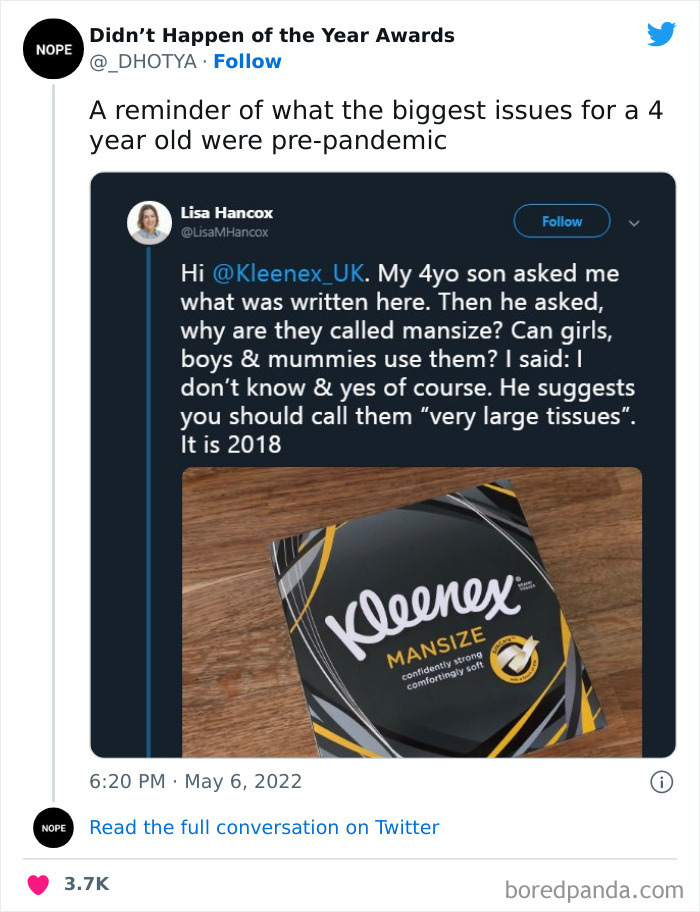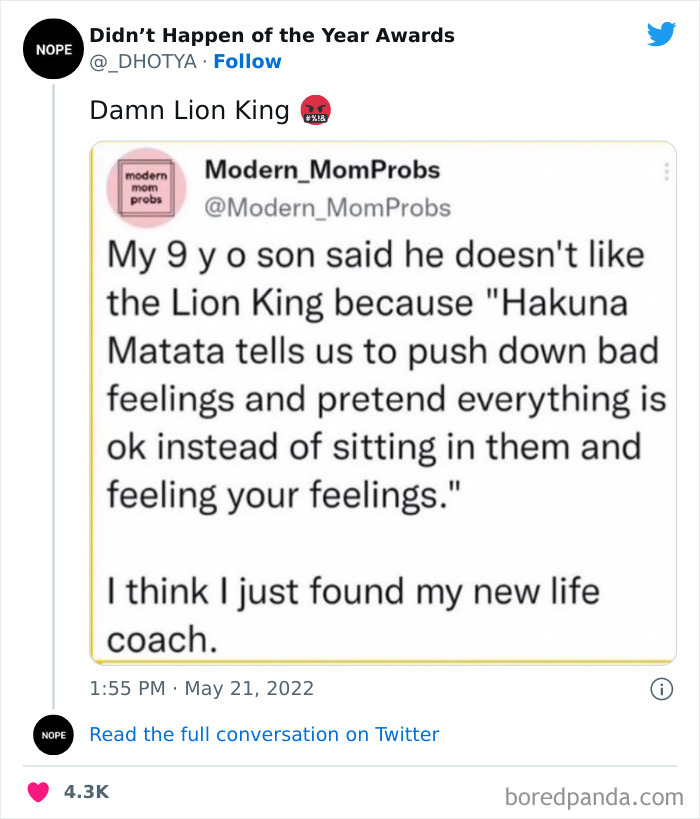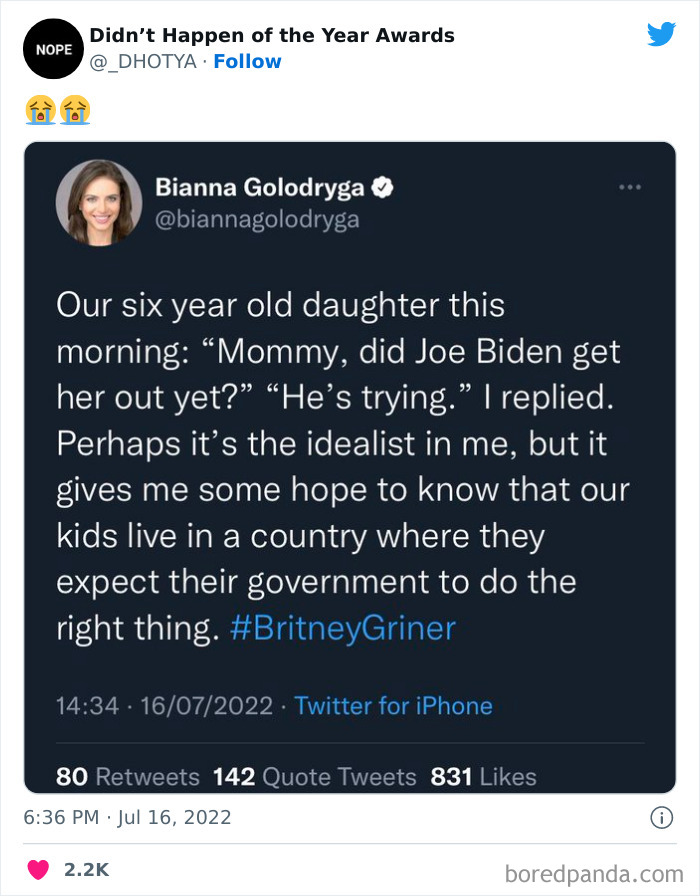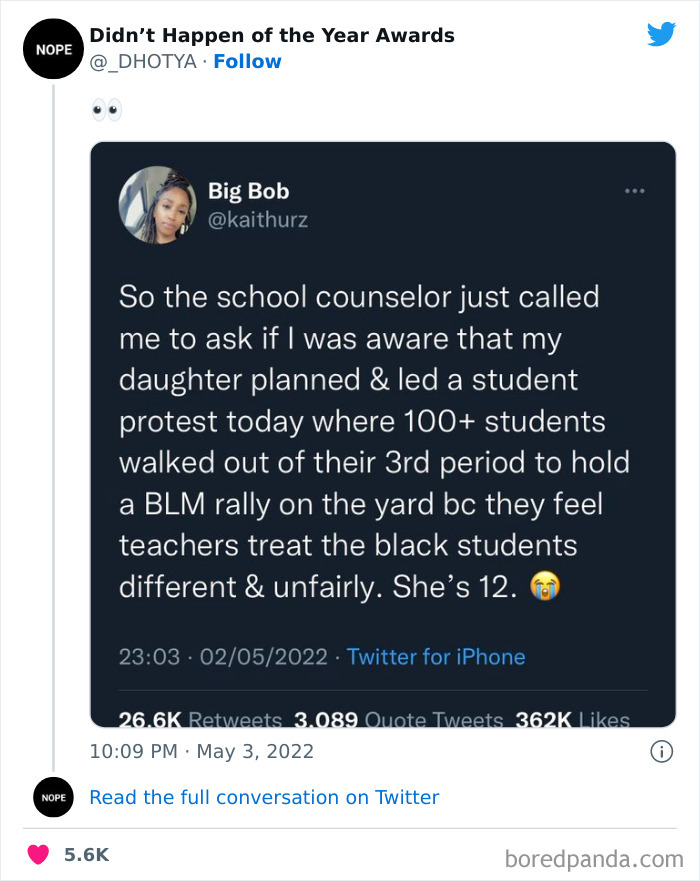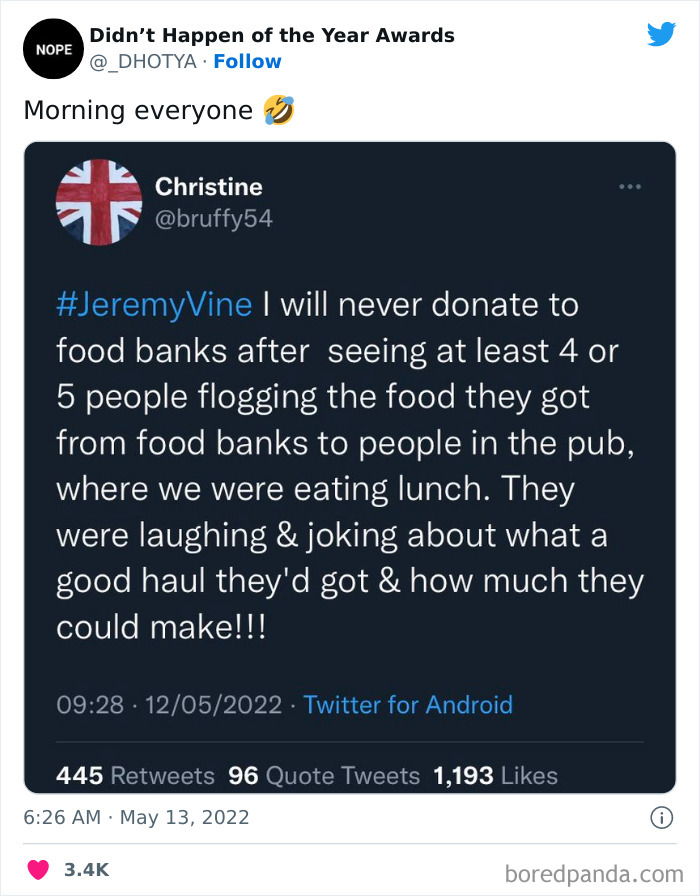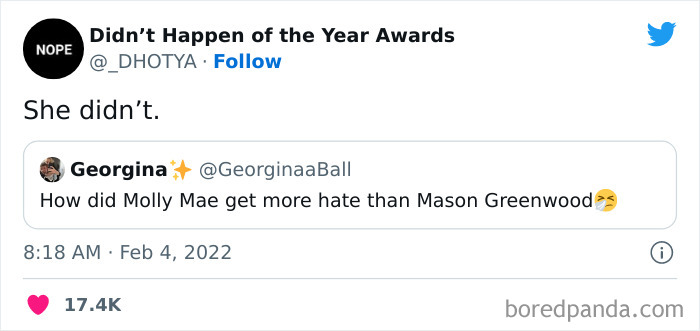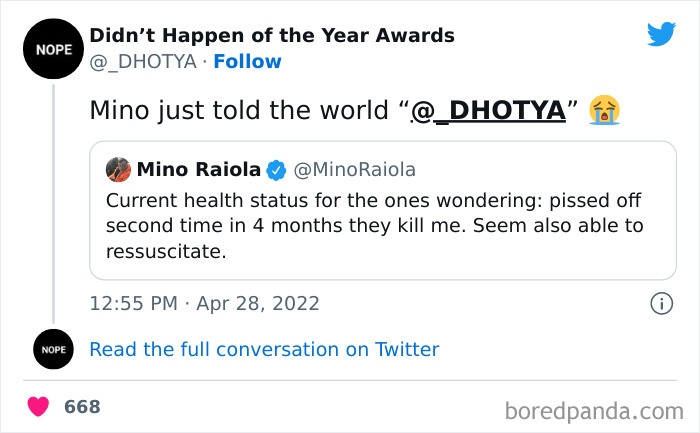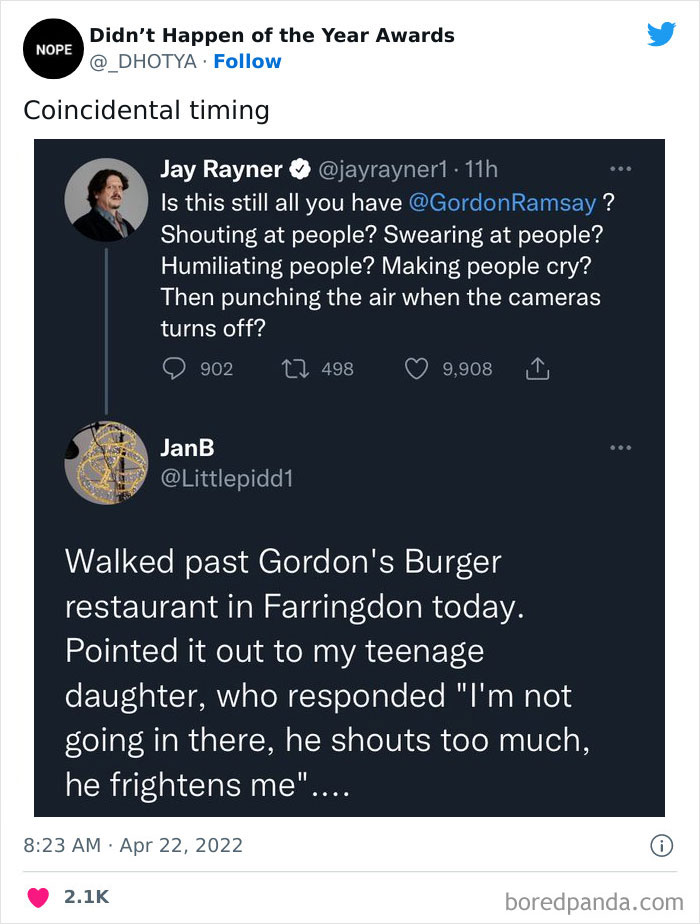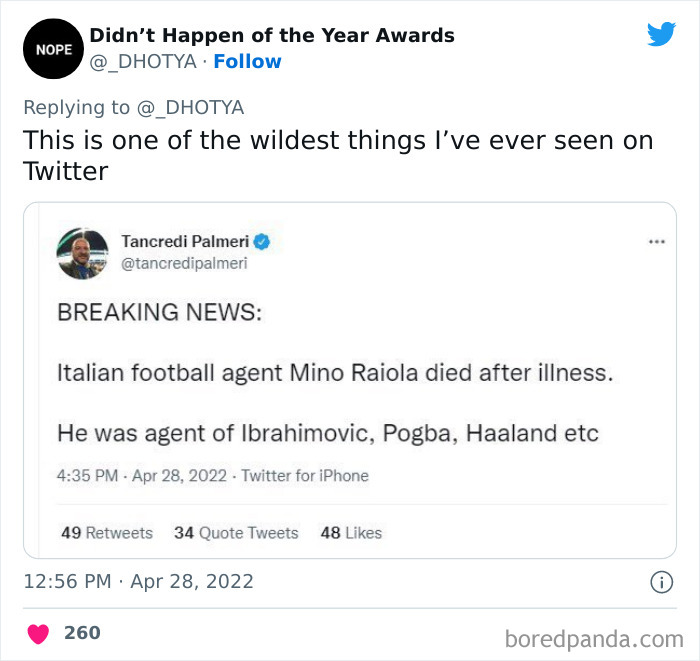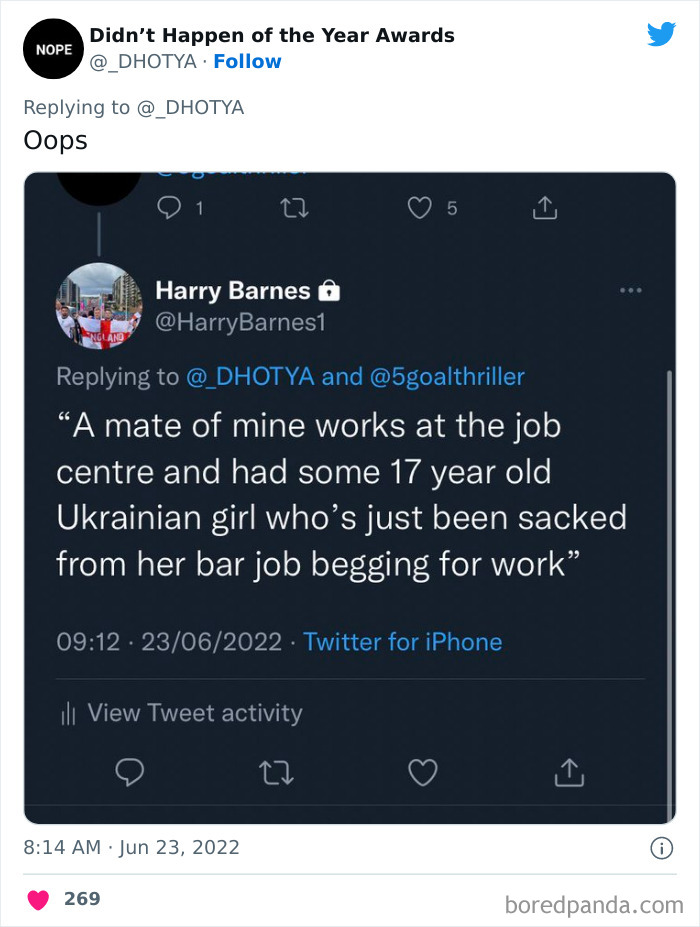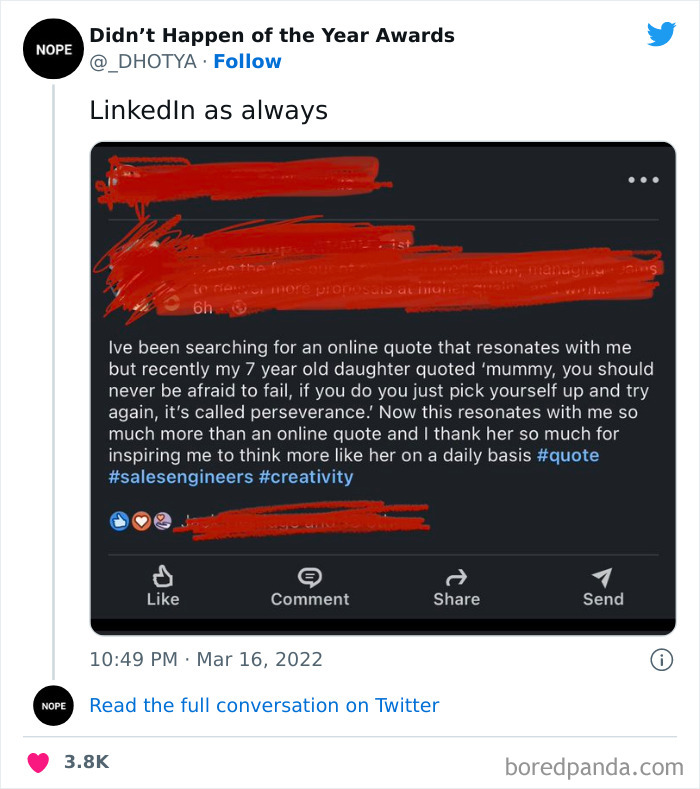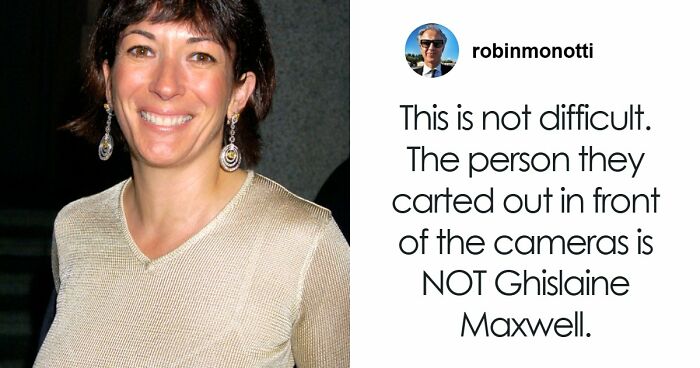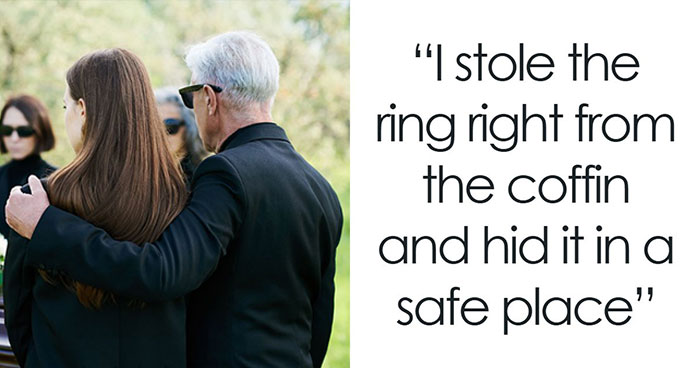
“Didn’t Happen Of The Year Awards”: 30 Cringe And Embarrassing Lies Spotted On The Internet (New Pics)
“My child is so smart. She’s only 7 months old, and she is already learning her second language!”
“Every time I go to the grocery store, the cashier gives me something for free! They tell me that I’m too pretty to pay for my food, and I always end up getting a huge discount!”
“A person cut me off in traffic, so I called the police and watched them pull up behind them and arrest them! That’ll teach people not to mess with me!”
We’ve all seen this type of story floating around the internet, primarily on Twitter and Facebook. And while it can be fun to exaggerate details for dramatic effect, people who tell tales that are outright untrue are just begging to be called out. To celebrate all of the liars online, the Didn’t Happen of the Year Awards Twitter account was born. This page compiles the most absurd and ridiculous stories that people attempt to pass off as experiences they have lived and gives the actors awards for their spectacular performances and imaginations.
Below, you’ll find some of our favorite posts from the account featuring truly Oscar-worthy writing and dialogue, as well as an interview with Martin Johnson, co-host of the podcast Secrets, which explores why we are so prone to lying. Be sure to upvote the tales you think belong on the big screen, and then if you haven’t had enough of these outlandish stories, you can check out Bored Panda’s last article featuring the same Twitter account right here.
This post may include affiliate links.
To gain some insight on why people are prone to lying in the first place, we reached out to Martin Johnson, co-founder and head of production at Soundtelling and co-host of the podcast Secrets. First, we wanted to know what inspired Martin to create a podcast about lies. "Me and Mohamed el Abed became inspired to create the podcast Secrets after long conversations between me and Julie Shapiro who was then working at PRX," Martin told Bored Panda. "Conversations that mostly were labelled 'work' in the schedule, but really were about life. And secrets became one of the topics. That we all carry secrets inside of us. Small and little lies that we live with through our lives. There have been scientific studies showing that we can ask people to not think about for example 'pink ponies'. And the only thing that they can think about after that are, of course, pink ponies - but then what happens to us if we carry real secrets inside of us? How does it change us as human beings?"
"Of course, studies show that we lie all the time," Martin continued. "Small little white lies to ourselves and others to make life more bearable. But then there is a gliding scale, you might not want to tell your partner that you have sexual fantasize about coworkers, as it might hurt your partner."
"But what we tried to understand and pinpoint were people whose lives had been intertwined in lies," Martin shared. "We found a nature photographer who was extremely well respected, but was caught photoshopping Lynx cats in his extremely beautiful pictures. We met a police officer who lived undercover as a drug addict, while having a family in his other life. And he could never talk about either life. Just to mention a few."
We also asked Martin what he thinks the most common reasons are for lying. "I have for the last 8 years been working as an investigative journalist, confronting and investigating people and authorities," Martin told Bored Panda. "And what always strikes me is that people don't really intend to lie. The lies becomes a consequence of events or information that they don't want to be disclosed to the world. And why not? They don't want everyone to know what might have happened, because then people might look at them in a negative way. One must not forget that we are animals, and one of our greatest driving forces are survival, and when we get pushed away by the greater flock - there is a great chance we wouldn’t survive (if we where still living in the savanna). Another thing that I often reflect over is that people take lies with them into death. If people really felt that they would be released if they exposed the secrets to the world - then imagine the amount of murder and crimes that would be confessed while people were dying, and that - frankly doesn’t happen often."
"The lies that we can see online are, of course, another layer," Martin adds. "The nature photographer that I mentioned - he published his photos online and in magazines - and therefore people online started questioning them. And that's how he eventually was exposed. But also nowadays - people lie online to provoke, because they feel like they are exposing a greater 'truth', and therefore the lies are accepted."
We also asked Martin if he thinks lies are ever justified or at the very least harmless. "According to science, an American has thirteen secrets - five of them never shared with anyone. Those five secrets can have a big impact on your physical and mental health (You're unfaithful, you’ve been raped by a family member when young, etc.). But those other secrets could be of another kind - I like to think of them as 'good secrets'. As a father of four children, I would never expose secrets that would hurt anyone in my family. So yes, lies are sometimes justified, and harmless."
"One part of secrets that people don't think about that often, because we tend to imagine secrets as something very personal - but there are secrets that can be shared and nourished within a small group of people. I spent three years of my life investigating a cult in Sweden for HBO Max - Pray Obey Kill. And they truly believed that their leader was the bride of Christ. She was going to marry Jesus when he came back to earth. And that secret that they kept for decades created an environment of physical and sexual violence. Where they controlled each other with even more lies. Almost like sopranos. So shared secrets at a smaller scale can sometimes be even more poisonous."
If you'd like to hear more from Martin about fascinating secrets people have kept, be sure to check out the podcast Secrets right here.
I'll take "Lies i Told My Boyfriend to Explain Away My Pregnancy While Cheating" for 1000, Alex
The internet is a fascinating place. As much as we love a larger than life story (after all, truth is stranger than fiction), we also love to rip apart anyone who gets caught lying. We go so quickly from being obsessed with exciting stories and being enamored with the absurd to turning into an angry mob with pitchforks when we feel stupid for being gullible. That’s why the Didn’t Happen of the Year Awards account is so much fun. Rather than falling for these ridiculous tales or seeing them and having no one to laugh with aside from any friends we send the tweets to via DM, readers get to laugh alongside over 420k other followers.
The page has become so popular that the creator, Harry Barnes, even has a book coming out later this year featuring some of the most ridiculous tales from the Twitter account. “Whether it’s Chris Eubank telling the world that aged 18, he should have won $100k on the American lottery but got diddled out of it by the grocery store guy only to use it as motivation to win a world title six years later, or Britney Spears claiming to have run the 100m in a little over five seconds, the DIDN’T HAPPEN OF THE YEAR AWARDS OFFICIAL BOOK is full of hyperbole, embellishment and embroidery from a whole host of online exaggerators,” the book’s description states. “The book is filled with exclusive content including the real story behind Tom Zanetti and his supposed helicopter ride which was featured in The Mirror, as well as how the DHOTYA got brought up in UK Parliament.”
Why are we so quick to ridicule people who share false stories online? We usually cannot prove that these situations didn’t happen, and it doesn’t really matter anyway. People exaggerate the truth all the time, whether it’s a stand-up comedian telling white lies to make their set funnier or a parent insisting to their child that if they don’t go to sleep right this minute, Santa Claus won’t be coming at all. Plus the internet is rampant with fake news anyway, is it really the responsibility of Twitter and Facebook users to keep our internet fib-free?
Maybe we do get upset when we feel the unspoken agreement to be honest has been violated. It is not surprising to see a big company or a politician spread false information, but regular people are supposed to be honest. We are the glue that holds sites like Twitter and Facebook together, so we cannot start turning on each other by insisting that our 2-year-olds can play piano better than Mozart. Well, I guess we can turn on each other when it comes to handing out Didn’t Happen of the Year Awards, but that’s more an issue of accountability. We just want to make sure that the online lying doesn’t get out of control!
There is also something about being online that makes us more bold than we are in real life. Sure, you might call out a colleague or close friend when they tell a story that sounds less than believable in person, but when that happens, we have to deal with the possible tension and argument that may ensue. Online, some people feel they can spew whatever nonsense they like without any consequences, and others decide that they can be the reality police dictating what can be shared publicly.
The idea of portraying a false or idealized image of ourselves online is nothing new. Instagram has long been known as purely a highlight reel of most people’s day to day lives, and on Twitter, the funniest and most outlandish tweets perform the best. It would not be as entertaining if these stories provided a caveat of, “Hey, just so you know, I made this up!” And we all know logically that our friends’ vacations are not purely peaches, sunshine and laying on beaches, but that’s what they are going to try to convince us through their social media posts. We understand that because we probably are guilty of sugar coating our own lives as well. But isn’t it a bit sad that some of us feel the need to come up with crazy stories to make ourselves sound more interesting?
For a start, it’s unlikely anyone would yell that in Tescos, maybe they muttered it under their breath in a passive aggressive way, and even if the other person replied, the British way would be either to not react at all, or maybe snigger slightly and then get back to whether they want the meal deal for £10 in Tescos, or have a treat at M&S.
Storytellers are not known for being particularly truthful, though. We’ve all seen biopics or films based on true stories that have warped many details and taken plenty of creative liberties to make stories juicier or more palatable to audiences. Author Jonathan Gottschall actually addresses the reasons why storytellers lie in his 2012 book The Storytelling Animal: How Stories Make Us Human. He explains that we are all actually guilty of stretching the truth, even if we don’t realize it. He shares that stories have been used for thousands of years to teach lessons, help us socialize, navigate relationships, moralize us, and help us determine our values and our need for justice. Because many storytellers had a motive behind why they shared a tale, it became widely accepted and implied that a story was not always fully truthful, but that didn’t matter. It was serving a separate purpose.
The default Switch either has grey or a red and a blue controller. I had to buy serval because of the Joycon Drift and I can assure you I've never seen two brown or two white Joycons sold together. They're mostly neon colorful, and as well, white turns yellowish pretty fast because of chemical reactions with skin
And when it comes to sharing stories about ourselves, Gottschall explains that they help us believe that our lives are meaningful. He writes that the “storytelling mind” is “allergic to uncertainty, randomness and coincidence”. We have a hard time dealing with chaos, so we often use stories to sort through our emotions and experiences. They allow us to feel a sense of order. And we’re all guilty of doing it. "[S]ocial psychologists point out that when we meet a friend, our conversation mostly consists of an exchange of gossipy stories," Gottschall writes. "And every night, we reconvene with our loved ones ... to share the small comedies and tragedies of our day."
As a 10 years old stupid kid I'd have probably wondered who's faster, people on camels or people on bears.
This one time, I went to take a vitamin, but I accidentally swallowed a Swingline stapler instead. Everytime I farted, I posted a new bulletin to the board in the cafeteria.
And as Maura Kelly writes in her article for The Atlantic breaking down The Storytelling Animal, social media certainly plays a hand in why people want to exaggerate their experiences. Even if you think of yourself as the most honest person on the planet, you might not be telling stories exactly as they happened. "Scientists have discovered that the memories we use to form our own life stories are boldly fictionalized,” Gottschall explains in his book. So no matter how well you think you remember an experience, you might need another witness to verify or contradict your story. Kelly notes that we often convince ourselves of lies as well, like that we handled a break-up extremely well or that we actually wanted to get fired from our cushy job so we would have time to pursue other things.
If she thinks your deaf and keeps asking questions, if she supposed to have been writing them down? Or did she know ASL and just thought you were an idiot for not knowing? Was she just shouting all night thinking it helps you read lips? lol
Dr. Nate Kornell also examined how our stories can veer farther and farther from the truth over time, even accidentally, in a piece for Psychology Today. He explained that our memories are often fluid and can be easily affected or manipulated. One example Kornell provides is how police need to be careful not to ask biased questions when talking to witnesses or suspects because their stories can change at the drop of a hat. “They basically treat a witness's memory like a crime scene: once you go over it a single time, it's irreversibly disturbed,” he writes. Kornell even admits that over time, we begin to remember the stories we tell, rather than the actual experiences they stem from. “I know the second time I tell a story, what I'm remembering is the first time I told the story. And the 201st time, I'm really remembering the 200th time. Many of our memories are records of our own stories, not of events that actually took place.”
He got himself through brexit and covid by partying and screwing the rest of us over.
Aside from telling stories that are far from the truth, many people lie about various things online, including our ages, our occupations, where we live, our relationship status, and more. One survey conducted by the UK’s Advertising Standards Authority found that a staggering 83% of kids between the ages of 11-15 had at least one social media account claiming that they were older than they actually were. This can lead to some dangerous or frightening situations for obvious reasons, but apparently, another survey found that 60% of parents in the UK saw no problem with their kids lying about their age to have access to social media sites. If the first time kids create a presence online is already based on a lie, doesn’t it set a precedent that they never need to be truthful on the internet?
And then he got down on one knee and asked you to marry him and you lived happily ever after
Plenty of people lie on dating sites as well. I’m not sure how they think building a relationship on lies will work, but perhaps these individuals are not looking for any serious commitments. (Regardless of what their profiles tell you!) Sadly, due to the superficial nature of these sites, many people feel pressured to stretch the truth about themselves to appear more attractive or interesting. We all know that catfishing is a problem online, but even if our faces are accurately portrayed, everything else might not be. According to Ash & Erie’s customer base, 80% of men admitted to lying about their height on dating apps. I don’t really see the point when advertising their true height can weed out shallow daters, but again, these men might not be looking for anything serious anyway.
So this “9-year-old” thinks it’s ok for people to read about slavery, genocide, war crimes etc and not feel a thing. Because it would only make you uncomfortable or sad or horrified, if you wanted to do those things yourself.. yeah that checks out and isn’t the fact opposite of how having empathy works…
It’s hard to not be skeptical when we hear crazy stories about alien abductions and children doing remarkable things. But we also have to be careful what we share online in the first place. When we make up stories or exaggerate them greatly, we risk opening ourselves up to great ridicule. But I guess high risks can come with high rewards right? A story that is way too unbelievable to be true just might earn you your very own Didn’t Happen of the Year Award! Keep upvoting your favorite stories, and then if you’re hungry for even more lies after finishing this list, you can find more winners of these infamous rewards right here.
Big shop? That's what I get when I just want a pint of milk! Do you think he has new mobile in the bottom of the bag?
Not even the first part is true, you don't diagnose a narcissist like that
These kids are surprisingly well-read on current events and media personalities. /s
I genuinely did have a taxi moment in London. I got a cab to take me from work to catch a train and asked him if he could hurry because I was going to meet my husband who just arrived back from Afghanistan. When we got to the station he didn't charge me he said buy my husband a beer instead.
Pretty sure the poor man was just saying he felt like he was treated inferior by the state and then you went on his nerves the whole drive long with your white privilege
Literally the entire point of the movie was that it was bad for Simba to ignore his feelings.
Idk if I want to live in a world where 6-year-olds concern themselves with politics.
Honestly not that far fetched. i knew someone after the Black Saturday bushfires here in Australia who went to every aid depot and collected boots and clothing and homewares and flogged it all on ebay. Her address fell in the general area of the fires, but her house wasn't so much as scorched.
I had to look this one up. He was a famous sports agent who represented big athletes in Europe. Had a long illness and while seeking treatment was declared dead by a media outlet that didn't fact check yet. He was understandably upset at the news. (But then he really did pass away not long after.)
I showed this to my two year old nephew and he said "Aunty why are people always making up things their kids supposedly said when they're obviously way too young to even have half the command of language required? Nobody's stupid enough to fall for that nonsense are they? I wanna biscuit."* (*Disclaimer: only one part of the preceding quote has been verified).
I showed this to my two year old nephew and he said "Aunty why are people always making up things their kids supposedly said when they're obviously way too young to even have half the command of language required? Nobody's stupid enough to fall for that nonsense are they? I wanna biscuit."* (*Disclaimer: only one part of the preceding quote has been verified).

 Dark Mode
Dark Mode 

 No fees, cancel anytime
No fees, cancel anytime 


